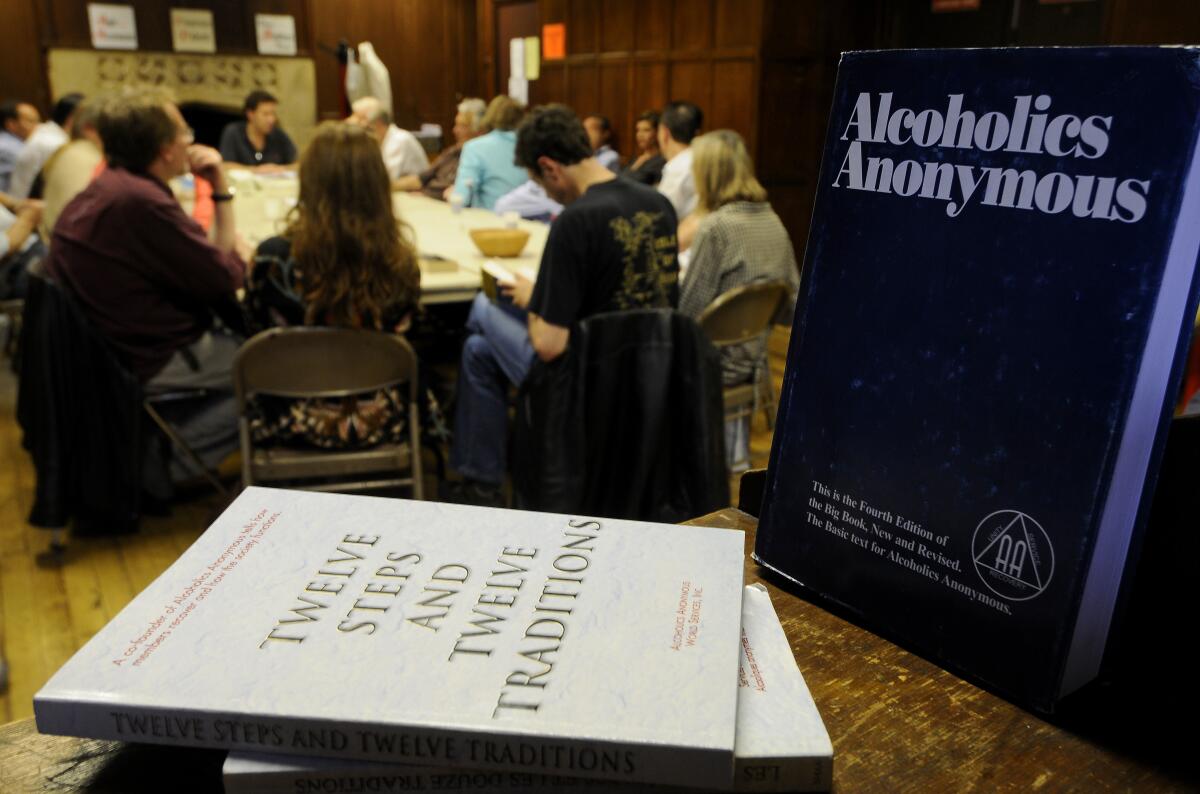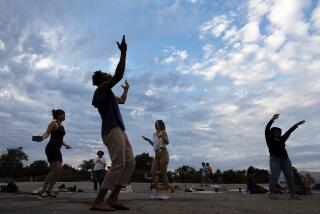Amid coronavirus, recovery community urges: Even if you skip 12-step meetings, stay connected

- Share via
It was time for the coveted sobriety chips, so Grace snapped on a pair of plastic gloves and kept a bit of distance as she doled out medallions to members who had gone 30, 60 and 90 days without a drink.
Normally, she hugs the people gathered here in this church on the Westside, but on Thursday she offered them a small namaste bow instead.
This is what an Alcoholics Anonymous meeting looks like during a pandemic.
“AA can’t totally close its doors,” said Grace, a 49-year-old yoga teacher, who asked to be identified by her middle name to respect the group’s anonymity pledge. “We don’t know when someone’s going to crawl in in desperation.”
She started coming to the rooms, as she calls the gatherings, two decades ago and now tries to attend two or three meetings a week, a tiny sampling of the more than 350 groups that meet every day in L.A.
They restored her life, she said, and she can’t help but think about others like her, who at this very moment, were considering whether they had the courage to attend their first meeting. What if, like Italy, we’re headed toward lockdowns?
These were the questions running through the minds of many in the recovery community this week. As the words “Cancel Everything” began to trend on Twitter and people quipped online about how they planned to self-quarantine with three bottles of tequila, some people wondered what would happen to the 12-step meetings they rely on.
What about the people who are understandably panicked and tempted to drink or pop a few pills? What exactly does the mandate to “practice social distancing” look like for people who so intimately know the dangers of isolation?
“We rely on community,” said Rick Manelius, an active member of a 12-step program. “It is very hard for people to white-knuckle it.”
For Manelius, 39, who lives in Colorado and works as a chief technology officer at a start-up, the questions started swirling in his mind last Friday toward the end of his weekly meeting. He’s the youngest member by about a decade, he said, and he noticed that instead of interlacing hands with people beside them during an end-of-meeting prayer some members decided to clasp their own hands together.
He began to think about all the other meetings like this across the country and how, sometimes by design, they’re rather low-tech. A church, chairs in a circle, some coffee. A real room people can walk into and find community.
In the days ahead, if quarantines come, Manelius said, he hopes people will turn to online platforms like Zoom to hold meetings via video chat or maybe download an episode of The Recovery Show podcast to listen to when they’re feeling alone. Still, he worries about older people, who might not be as familiar with technology and who are at the highest risk of dying from COVID-19.
“Our elders are being given an extra dose of fear and anxiety,” he said, and for many people these meetings are like free therapy. “You don’t want to help spread this contagion with a high mortality rate, but at the same time, it’s like your mental and emotional health is on the line.”
He’s been thinking, too, about people who are in the early stages of recovery. There’s the 90-in-90 concept, he explained, in which, early on, people often try to attend a meeting per day to set new habits. If we move toward mandatory quarantines, he fears, that will set up yet another barrier for newbies.
“Anyone who’s on the recovery train knows that the second resistance comes up, it’s like, ‘Eh, I can skip it,’” Manelius said, encouraging anyone who doesn’t yet have a sponsor to get one as soon as possible and check in with them often by phone.
Back in Los Angeles, this week felt like a tipping point.
Before then, you could see signs of concern on the face of the pregnant cashier at Vons who held her breath when she heard a customer sneeze or in the stern scolding from the mother whose infant child had just gripped the metal pole on the Metro.
But now, the signs were almost everywhere — light traffic, emptied out shelves of thermometers, a tweet saying the L.A. Central Office of Alcoholics Anonymous had told members not to hold hands.
A woman who answered the phone at the L.A. Central Office this week explained that that simply wasn’t true — each group is autonomous, she stressed, and free to make their own decisions. But members had been calling about the coronavirus, she said, and she’d started pointing them to a memo on the national Alcoholics Anonymous site.
Some groups had started discussing precautions, the memo said, such as avoiding handshakes and cutting back on serving snacks. Others had started creating contingency plans in case they can’t meet in person, the memo said, such as swapping phone numbers, emails and social media accounts so members can check in on one another.
The memo also pointed members to www.aa-intergroup.org, a directory of virtual meetings in different time zones, which are conducted by phone, email, video conference and 24-hour-a-day chat rooms.
There are dozens and dozens of different groups.
For Spanish speakers in rural areas, there’s Grupo Universal de AA, which conducts voice-only meetings through Skype, and for those who are hard of hearing, there’s Wednesday Text Chat, which conducts meetings via Zoom. There’s the group a Safe Place for members of the LGBTQ community, a Spiritual Recovery for agnostics and freethinkers, and even Sober Stogies for people who stay away from alcohol but still love a good cigar.
For Grace, the yoga teacher, it was comforting to see others start to brainstorm and prepare. She’d been charting the coronavirus’ path closely since January, keeping in touch with a friend who works as an emergency room nurse in Seattle.
“They’re really strapped,” Grace said.
She had started to feel a bit discombobulated, she said, as she read horror stories from Italy and then looked around Los Angeles and saw most people acting rather blasé. Well, either that, she said, or behaving as if Armageddon had already set in and they needed to ransack Trader Joe’s immediately.
There didn’t seem to be a lot of in between.
So, during her Alcoholics Anonymous meeting Thursday, Grace said she decided to make a bit of a show of her heightened precautions. After putting on her gloves, she gave each member who got a sobriety chip a bonus gift: an antibacterial wipe. “We’re living in interesting times,” she told the group, which was about half the size as usual.
Grace has also been thinking a lot about newcomers to recovery and how these next few days could be so fragile for them. She thought back to the weeks before she finally went to her first meeting — back to when she was convinced she was terminally unique.
“You feel like you’re in a desert just gasping,” she said, “and this oasis comes, and you go, ‘Oh, I’m not the only one.’”
These are stressful and unnerving times and fear can be such a big trigger for addicts. For some, Grace said, this will be a breaking point and, for that reason, she’s confident that some meetings will stay open. But she’s hopeful, too, that members will adapt by upping the frequency of their group text conversations or hosting meetings on Google Hangouts.
In many ways, she said, the recovery community is better prepared for this moment than almost anyone.
“We’re taught resilience,” she said. “We’re taught that there is a way through and that we figure it out one day at a time, step by step.”
People in recovery also have a lot of practice channeling their fears and anger into service, she said. If you have two days of sobriety, the mantra goes, you can help the person who has one day, and if you have one day, you can help the person who has one minute.
Right now, she said, the world could use another message her community knows well.
We support one another to survive.
More to Read
Sign up for Essential California
The most important California stories and recommendations in your inbox every morning.
You may occasionally receive promotional content from the Los Angeles Times.














